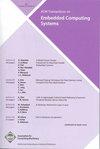通信和计算故障下控制系统的随机分析
IF 2.6
3区 计算机科学
Q2 COMPUTER SCIENCE, HARDWARE & ARCHITECTURE
引用次数: 0
摘要
控制理论允许人们设计对外部干扰、模型简化和建模不准确具有鲁棒性的控制器。研究人员已经研究了鲁棒性是否会延续到控制器的数字实现中,主要是观察控制器对通信或计算问题的反应。通信问题通常使用随机变量进行建模(例如,估计在传输过程中发生故障的概率),而计算问题则使用控制任务必须满足的截止日期数量的确定性保证进行建模。这些故障模型允许工程师设计鲁棒控制器,并在孤立故障存在时评估控制器的行为。尽管与控制系统的实际实现非常相关,但当这些故障同时发生时会发生什么问题还没有一个适当的答案。本文利用马尔可夫跳变线性系统理论给出了收敛性几乎确定保证的稳定性契约,在随机环境下回答了这个问题。对于线性定常马尔可夫跳变线性系统,均方稳定性意味着几乎肯定的收敛性——这是我们研究的中心性质。我们的研究主要强调了闭环系统的这一特性的验证,这些系统可能同时发生数据包丢失和计算超支。我们将我们的方法应用于最近文献中的两个案例研究,并展示了它们对一组全面错误的鲁棒性。我们采用闭环系统模拟来经验推导性能指标,阐明控制器实现的质量,如系统稳定时间和积分绝对误差。本文章由计算机程序翻译,如有差异,请以英文原文为准。
Stochastic Analysis of Control Systems Subject to Communication and Computation Faults
Control theory allows one to design controllers that are robust to external disturbances, model simplification, and modelling inaccuracy. Researchers have investigated whether the robustness carries on to the controller’s digital implementation, mostly looking at how the controller reacts to either communication or computational problems. Communication problems are typically modelled using random variables (i.e., estimating the probability that a fault will occur during a transmission), while computational problems are modelled using deterministic guarantees on the number of deadlines that the control task has to meet. These fault models allow the engineer to both design robust controllers and assess the controllers’ behaviour in the presence of isolated faults. Despite being very relevant for the real-world implementations of control system, the question of what happens when these faults occur simultaneously does not yet have a proper answer. In this paper, we answer this question in the stochastic setting, using the theory of Markov Jump Linear Systems to provide stability contracts with almost sure guarantees of convergence. For linear time-invariant Markov jump linear systems, mean square stability implies almost sure convergence – a property that is central to our investigation. Our research primarily emphasises the validation of this property for closed-loop systems that are subject to packet losses and computational overruns, potentially occurring simultaneously. We apply our method to two case studies from the recent literature and show their robustness to a comprehensive set of faults. We employ closed-loop system simulations to empirically derive performance metrics that elucidate the quality of the controller implementation, such as the system settling time and the integral absolute error.
求助全文
通过发布文献求助,成功后即可免费获取论文全文。
去求助
来源期刊

ACM Transactions on Embedded Computing Systems
工程技术-计算机:软件工程
CiteScore
3.70
自引率
0.00%
发文量
138
审稿时长
6 months
期刊介绍:
The design of embedded computing systems, both the software and hardware, increasingly relies on sophisticated algorithms, analytical models, and methodologies. ACM Transactions on Embedded Computing Systems (TECS) aims to present the leading work relating to the analysis, design, behavior, and experience with embedded computing systems.
 求助内容:
求助内容: 应助结果提醒方式:
应助结果提醒方式:


